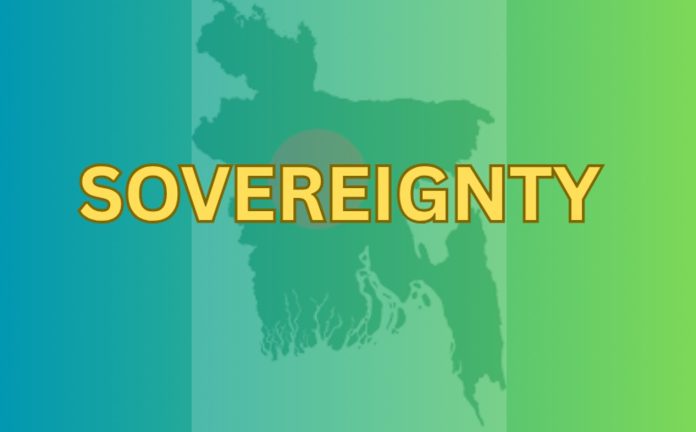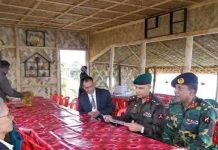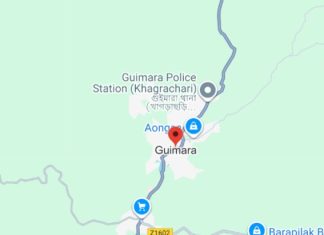Commentary Report
After the gang-rape of a Marma schoolgirl in Khagrachari on 23 September, when protests began demanding justice, a certain group in the Chittagong Hill Tracts started shouting about “sovereignty.” Their cries sounded like: “It’s all over, sovereignty is gone!” They somehow discovered a “foreign conspiracy” behind the anti-rape movement.
But what’s astonishing is this: when settlers hold rallies, militant processions, and strikes with false accusations to protect the criminal rapists and attackers — when they unleash communal violence against hill people, burn their homes, and loot their property — these same people do not see any “conspiracy to destroy” the indigenous communities. Rather, they seem to think such attacks are necessary to protect the country’s sovereignty.
As a result, none of these attacks are investigated, and the perpetrators go unpunished — in fact, they are often rewarded. This pattern has continued in the Chittagong Hill Tracts for generations.
Listening to the so-called “guardians of sovereignty,” one might think that if the hill peoples hold a peaceful rally or raise a just demand, the nation’s sovereignty will somehow collapse — as if sovereignty were so fragile! Hence, far from accepting the demands of the hill peoples, these “guardians” do not even want them to voice their grievances. They refuse to allow peaceful movements and instead provoke communal clashes to suppress them.
For example, on 19–20 September 2024, communal attacks were carried out in Dighinala, Khagrachari, and Rangamati, and again on 28 September this year in Ramesu Bazar of Guimara, a Marma-inhabited area. In both instances, the hill peoples were peacefully protesting for their legitimate demands.
The “standard-bearers of sovereignty” hold the belief that the hill peoples are a threat to sovereignty. Therefore, they do not allow the indigenous Jumma political parties to operate democratically or to exercise freedom of speech. On the rare occasion when someone dares to speak openly or tell the truth, they are silenced through sham trials — kangaroo courts that hand down prison sentences as punishment. They are subjected to direct and indirect intimidation and threats.
These “defenders” want to fill the hills with army and security camps — to turn the entire Chittagong Hill Tracts into one vast cantonment.
They have no trust whatsoever in the hill peoples when it comes to protecting sovereignty. That is why they aim to resettle Bengali Muslims throughout the region — to transform the Hill Tracts into a Bengali-Muslim-dominated area. To achieve that, the lands of the indigenous peoples must be seized, which inevitably leads to conflict. And every time, the state takes the side of the settlers.
The views of these “protectors of sovereignty” regarding sovereignty and the Chittagong Hill Tracts are a blatant manifestation of extremist Bengali Muslim nationalism. Deep down, they do not consider the hill peoples to be true citizens of Bangladesh; they regard them as enemies — as obstacles to national sovereignty. Thus, far from granting them the right to self-determination, they are even denied their constitutionally guaranteed fundamental rights.
Undoubtedly, sovereignty is an extremely sensitive and important matter for any country. It is not only a military issue but also a political one. Therefore, the question arises: if sovereignty in the Chittagong Hill Tracts is under threat, can it truly be protected by excluding the indigenous peoples — by distrusting or being hostile toward them — relying solely on military means?
Those who think so have no real understanding of what sovereignty means or how it is preserved.
One major reason for the ongoing unrest in the Chittagong Hill Tracts is that the fate of the region has been handed over exclusively to these ignorant “dealers in sovereignty” — the generals. Today in Bangladesh, there seems to be no political leader capable of asserting control and authority over these generals or offering a rational political solution to the Hill Tracts issue.
It must be remembered that, ultimately, the protection of sovereignty — like the waging of war — is a matter of political decision-making, not something to be left entirely to the generals. Whenever it is left to them, the outcome is never good.
Therefore, borrowing the famous remark of French Prime Minister Georges Clemenceau during World War I — and replacing the word “war” with “sovereignty” — I would say:
“Sovereignty is too important a business to be left to the generals.”
Both Bangladesh’s military generals and its political leaders would do well to remember that.
(1 November 2025)
—————-












